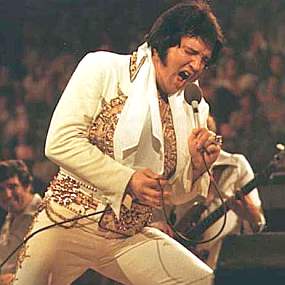{If you’re not in the mood for a mid-week rant, then skip today’s post. I apologize in advance…}
No milk. Time to run to the grocery store. Time to wonder what weird rip in the space-time continuum brings me to this other, oddly parallel town.
Yes, the Kroger store transports me to some burg called Scooterville. Every row of the store has some person riding a battery-powered scooter up and down the aisles, that person grabbing the essential foodstuffs Man has feasted on since the dawn of time: Pop-Tarts, Twinkies, fried cheesecake, and countless other comestibles sure to give a pancreas a fit.
And from what I can tell, pancreases across this country are calling it quits. “No mas! No mas!”
In the last month, I’ve heard one guy after another tell me he’s wearing a CPAP mask at night and poking himself with syringes filled with insulin. Can’t breathe, can’t keep the blood sugar stable. It’s scary.
Now while it’s true that I turn 45 mere days from now, I don’t want to be staring that future in the face. So even though I’m healthy, I’m making some dietary changes.
This is not to say I’m obese like the drivers of the scooters that clog the aisles of my neighborhood Kroger. In fact, at 6′ 4″ and 217 pounds, I’m the lightest guy my height that I know. Most of the others are 235 and up.
I was pretty much a stick in high school and even then I wore pants with a 36 waist. I wear 38 today, but I highly suspect that a 38 today is not what it was twenty-five years ago. A tape measure around my waist says 41, but I’m still got plenty of room in the waist of my size 38 jeans, so something ain’t right.
I’ve got no gut to speak of, but the powers that be say you can’t have a waist larger than 40 inches or else you face a plethora of vascular and endocrine issues. Now the rule seems a bit off when you compare 6′ 4″ with a 40 waist with 5′ 9″ and 40, but we tall people are out of luck in plenty of other regards. (In other words, if your house was built before 1965, don’t ask me to come down into your basement.)
No matter how svelte I am compared with peers, I still don’t want to end up a diabetic having a machine breathe for me at night, so I’ve started a low-glycemic diet in the last week and have already seen good results.
Now I don’t want to seem judgmental here, but there’s no way to escape it: anymore, we’re a nation of fatties. When I have to walk around the end of an aisle to get past someone oozing over the sides of a scooter, something’s gone wrong. Fill every row with a massive rotundity piloting a 3-wheeler, and we’ve moved beyond wrongness into outright tragedy.
I think about this national corpulence at the same time I read that a Senate panel is investigating the bank accounts of a half dozen Pentecostal/charismatic televangelists. Just as some people’s bodies swell up like Violet Beauregard on a tour of Wonka’s, so too do these evangelists swell their own personal larders at the expense of the gullible and poor.
That the government sees fit to investigate when the governing bodies of those evangelists’ denominations sit like three chimps masking various sensory organs…well, I know a few folks who should be ashamed of themselves. And for once, it’s not government folks.
We talk about a lot of blind spots in the American Church here at this blog, but I’m not sure we’ve ever fully discussed our love of excess. Some of us love our preachers loud and larger than life. Some of us like a good 3-ring circus on Sundays. And if people can barely squeeze down the aisle to get to the altar to confess every sin known to man SAVE for rapacious gluttony, then that’s okay, too.
Only it’s not okay.
I’m not sure why we give this one a pass. Why do we tolerate excess in our churches? The only excess we should be seeking is an overflow of the Spirit of God, yet some of us donate money hoping to get more—and still more on top of that—because some Dior-wearing televangelist’s wife caked under fifty pounds of Mary Kay says so (because, as she’ll tell you, winter’s coming and nothing stops the frosties better than a Russian sable coat). We’re turning into sweaty-faced lard-buckets hollering about those damned liberals and their abortions, or those red-diaper babies selling America down the commode, yet we can’t pull ourselves away from the “Stuff Yourself till You Explode” brunch bar at the local Big Boy.
We’re turning into sweaty-faced lard-buckets hollering about those damned liberals and their abortions, or those red-diaper babies selling America down the commode, yet we can’t pull ourselves away from the “Stuff Yourself till You Explode” brunch bar at the local Big Boy.
No, it’s not just the charlatan televangelist promising 21st century indulgences. It’s not just the human amoeba scrunched down in his scooter trying to use a grab stick to procure a family-sized bag of Famous Amos cookies from the top shelf. No, it’s those of us who think Jesus died to ensure us a good credit score so we can buy more crap than the guy next door.
So again, I ask, “Why do we tolerate excess in our churches?” Why do we tolerate pews filled with one Mr. Creosote after another? Why can’t we wise up to con-artists televangelists who take and take and take, all the while sporting their Patek Philippes for the slack-jawed to ogle? Why do we measure spiritual success in terms of how big congregants’ houses are rather than how large their hearts might be? Again, show me a church, when selecting a new elder, that’ll pick the humble guy who works in a convenience store over the preening captain of industry, and I’ll show you a church Smyrna would embrace.
Too much. Too stinkin’ much.
If we want to make a difference in this world, then we better live so we can say without irony, “Jesus alone is my satisfaction.”

 But when it comes right down to it, smart parents have smart kids—no matter what kind of education (public, private, or homeschooled) their children receive—because the parents themselves value education and pursue it in their own lives.
But when it comes right down to it, smart parents have smart kids—no matter what kind of education (public, private, or homeschooled) their children receive—because the parents themselves value education and pursue it in their own lives. but God forbid if some trained Christian artist creates a challenging oil painting and asks for support.
but God forbid if some trained Christian artist creates a challenging oil painting and asks for support.